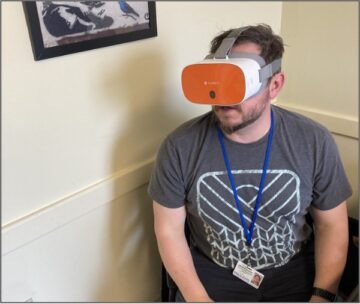Since the public release of ChatGPT took the world by storm last fall, many educators have worried about students using the highly advanced, artificially intelligent chatbot for cheating on school assignments by passing off AI-generated work as their own. But if AI can be used to produce written content, can it also be used to determine whether a piece of writing was created by AI or by a human being?
That’s what Turnitin is hoping to do with a new feature the company has added to its existing writing tools. Beginning April 4, all Turnitin products—including Turnitin Feedback Studio (TFS), TFS with Originality, Turnitin Originality, Turnitin Similarity, SimCheck, Originality Check, and Originality Check+—will include AI detection capabilities for existing users.
Turnitin began working on detection capabilities for GPT3, the underlying technology upon which many AI writing applications are based, nearly two years before the release of ChatGPT.
“Educators told us that being able to accurately detect AI-written text is their first priority right now. They need to be able to detect AI with very high certainty to assess the authenticity of a student’s work,” said Turnitin CEO Chris Caren.
- SEO Powered Content & PR Distribution. Get Amplified Today.
- Platoblockchain. Web3 Metaverse Intelligence. Knowledge Amplified. Access Here.
- Source: https://www.eschoolnews.com/digital-learning/2023/04/14/can-technology-help-schools-prevent-ai-based-cheating/
- :is
- 1
- 10
- 20 years
- a
- Able
- About
- accurately
- added
- advanced
- AI
- All
- and
- applications
- April
- ARE
- AS
- At
- authenticity
- author
- banner
- based
- BE
- before
- began
- Beginning
- being
- by
- CAN
- capabilities
- Center
- ceo
- certainty
- chatbot
- ChatGPT
- cheating
- check
- Chris
- COM
- comments
- company
- content
- covering
- created
- description
- Detection
- Determine
- editor
- Education
- educational
- educators
- English
- existing
- Fall
- Feature
- feedback
- First
- For
- Former
- freelance
- from
- Have
- height
- help
- High
- highly
- hoping
- http
- HTTPS
- human
- include
- Intelligent
- issues
- IT
- ITS
- journalist
- jpg
- Last
- many
- math
- National
- nearly
- Need
- New
- new feature
- news
- of
- on
- originality
- own
- Passing
- piece
- plato
- Plato Data Intelligence
- PlatoData
- policy
- Posts
- prevent
- priority
- produce
- public
- reform
- release
- Said
- School
- Schools
- spent
- Storm
- Students
- such
- Technology
- that
- The
- the world
- their
- to
- tools
- underlying
- university
- URL
- us
- users
- Welcomes
- What
- whether
- which
- with
- Work
- working
- world
- worried
- writer
- writing
- written
- years
- zephyrnet
















